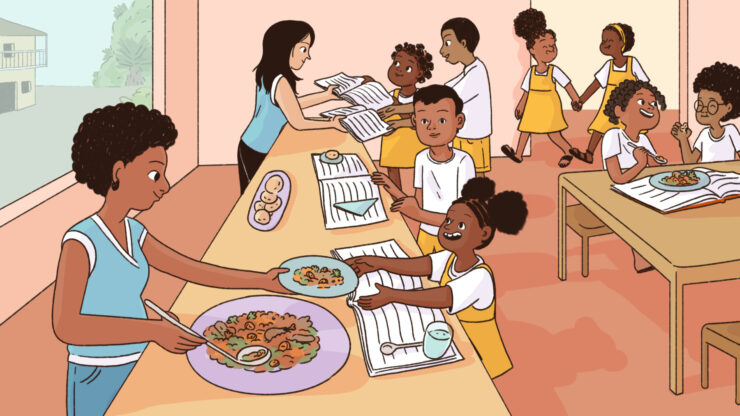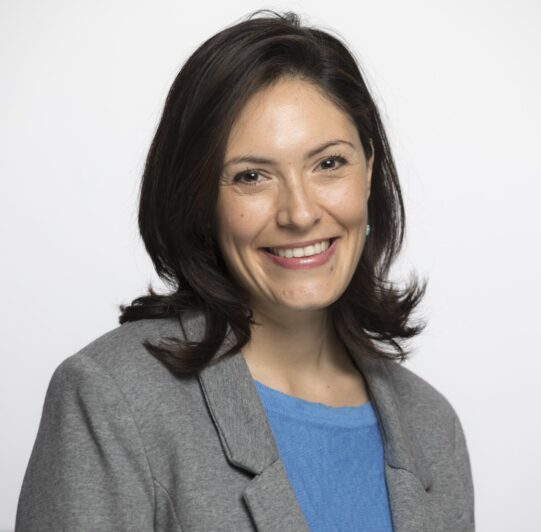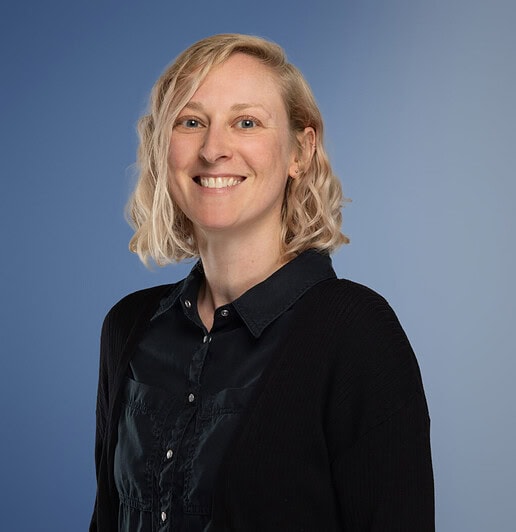The economist empowering parents to help children thrive
Elisabetta Aurino is using research as a tool for social justice

Elisabetta Aurino is passionate about researching child development in low- and middle-income countries. She sees parents as the experts on their own children, and aims to empower them as well as educators and policymakers to support children. Annie Brookman-Byrne finds out more.
Annie Brookman-Byrne: What are you trying to understand about child development?
Elisabetta Aurino: I deeply believe that all children deserve the chance to reach their full human potential through access to quality nutrition, nurturing care, and education. I focus on low- and middle-income countries—or what I like to call ‘majority settings’—because this is where 90% of the world’s children live and where challenges like poverty, violence, and food insecurity are most concentrated. Providing children with a strong start in life is crucial not only for their personal development, but also for fostering more equitable and prosperous societies. While it’s puzzling how comparatively little research focus this area receives, it’s also a tremendous opportunity for impact, as investing in children yields enormous returns. This is why I care deeply about my research, and it’s what motivates me to work every day.
“All children deserve the chance to reach their full human potential through access to quality nutrition, nurturing care, and education.”
ABB: What first drew you to this field?
EA: Growing up in Italy, I became deeply aware of social justice issues and the stark inequalities shaping our world. As a teenager, I often wondered: Why did I live in such an affluent society while, elsewhere, girls like me were out of school, already married, or facing countless hardships? Driven to understand the social and economic roots of these disparities, I decided to study economics as a tool for social justice and change.
Initially, I dreamed of becoming a journalist, hoping to spotlight these inequities and inspire action through the power of knowledge. But everything shifted when I took a course in development economics and discovered Amartya Sen’s human development approach. That course literally changed my life, because it framed the process of development as the expansion of human capabilities, focusing on flourishing, agency, and empowerment, rather than in terms of economic growth as I had been taught before. After that mind-blowing course, I knew I wanted to use the tools of economics and statistics to generate rigorous, policy-relevant evidence. Later, during my PhD studies, I chose to focus on children, realizing that levelling the playing field early in life yields profound and equalising benefits over the lifespan and across generations.
ABB: How does your research help children?
EA: My various projects span the entirety of childhood—from the early years through adolescence—and address multiple, interlocking dimensions of child wellbeing, including education, nutrition, food security, and social-emotional development. Much of my research has focused on how experiences of food insecurity during childhood shape health and educational trajectories from the early years into young adulthood. Given the extent of hunger in low- and middle-income countries, I was surprised to find this area so under-researched when I started working in it.
Since my work ultimately aims to provide actionable evidence for impactful change, I am especially interested in policies or programs that are already at scale or show scaling potential. I’ve worked extensively on school meals. As many as 418 million children receive food at school every day, yet surprisingly little research has investigated the effects of large-scale programs on learning outcomes, for example, or how school meals function as a safety net during crises. I was able to show that in Ghana and Mali, respectively, school meals not only improve nutrition, but can support learning in Ghana, and keep kids, especially girls, in schools even in times of conflict in Mali. I’m heartened to see these findings now cited in policy reports, and helping to shape conversations around this critical support system for millions of children and their families.
With my friend and colleague Sharon Wolf, a psychologist at the University of Pennsylvania, I am studying whether quality preschool can impact later learning and life trajectories for children in West Africa. We have found that children who attended higher-quality preschools had better educational outcomes around age 11—even during the COVID crisis, when children had been at home because of the year-long school closures in Ghana. In our latest data, these effects seem to have dissipated around puberty. Thus, now we are studying which home or school inputs later in childhood can support long-term gains from preschool, or whether we will observe the long-term effects of preschool later in adolescence, as we are still following up these children as they are growing.
ABB: Have you noticed any crossover between your research and your personal life?
EA: I’m not sure if it’s a coincidence, but I became a parent a few years ago, and recently much of my work has focused on parenting! Parents have every incentive to support their children to thrive, yet in majority-world contexts this potential remains largely untapped by policies, especially when it comes to adolescents. To bridge this gap, I dived into the psychology research on parenting, which I try—however very much imperfectly—to apply with my own two daughters.
“Parents have every incentive to support their children to thrive, yet in majority-world contexts this potential remains largely untapped by policies.”
As a parent, and from talking with other parents, I observe that we try to do our best, but it’s the hardest job in the world! Constraints are especially great for parents from low socioeconomic strata or living in low-resource contexts, who often grapple with food insecurity, multiple jobs, a million stressors and low institutional support. Coming from this shared perspective, I tried to weave in empathy in my own work while developing a parenting intervention for young adolescents in Ghana. By collaborating with psychologists and behavioural scientists in Ghana and the US, our approach aims to empower parents as the experts, helping them reflect on their family strengths and build skills to support their children through the pivotal, yet challenging, adolescent years. We are currently testing whether this program has effectively supported parents and adolescents.
ABB: What are you most excited about pursuing next?
EA: Definitely this parenting intervention. We have developed a low-cost, family-focused program in Ghana to serve busy households in urban and peri-urban areas. Parents and adolescents come in, work separately for a period of time, and then get together to practice the skills that they have learnt in the first part of the session through role-plays and games. We appreciate that busy parents in Accra and surrounding areas have very little time to attend in-person sessions and to spend with their children, so our program tries to support them also through low-tech tools such as SMS reminders. These reminders encourage parents’ involvement in their children’s learning, and we hope they will improve adolescent, parents, and family outcomes. I am excited to find out whether our parenting intervention helps children thrive, and to share our findings in the years to come.
Footnotes
Elisabetta Aurino is an economist whose research focuses on child nutrition, health, education and broader well-being outcomes. She received her PhD in Economics from University of Roma Tre (Italy), and subsequently she has worked at Young Lives, University of Oxford, and at the School of Public Health and the Business School at Imperial College. She also consulted for the University of Pennsylvania, United Nations FAO, IFAD, and the European Commission. Her research focuses on scalable interventions to support child development in both low-income and humanitarian contexts. She is a Jacobs Foundation Research Fellow 2021-2023.
Elisabetta on Bluesky
Elisabetta’s website
This interview was edited for clarity.

